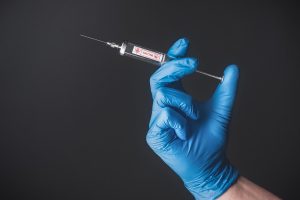Author: Ruth Glaeser
The Third Circuit Court of Appeals held that Merck is exempt from antitrust claims under the Noerr-Pennington doctrine in a lawsuit accusing it of deceiving the government about the effectiveness of its mumps vaccine to prevent competition.
Background from the Third Circuit’s Opinion
Merck was the sole licensed manufacturer of mumps vaccines in the United States for over fifty-five years, until 2022. The vaccine was FDA-approved and included an FDA-approved label that outlined its shelf life, minimum-potency requirements, and effectiveness. Merck had an ongoing duty to ensure that the drug label was accurate.
In the late 1990s, the FDA expressed concern that Merck’s mumps vaccine did not provide immunity near the end of its purported 24-month shelf life. At the FDA’s suggestion, Merck overfilled the vaccine doses to try to make the doses potent through the end of the shelf-life period.
But this did not resolve the issue, and Merck did not share that information with the FDA. Merck feared that disclosing this information would lead the FDA to require a change in the vaccine’s label. And a label change was particularly problematic for Merck because it competed with GlaxoSmithKline (“GSK”), which sold a similar vaccine in Europe. Merck thought that GSK’s vaccine would soon enter the U.S. market and a label change on Merck’s vaccine would make it easier for GSK to demonstrate that its vaccine was not inferior to Merck’s.
So, to preserve its market dominance, Merck misrepresented the vaccine’s potency and effectiveness at the end of its shelf life. To support this, Merck ran a clinical trial and claimed that it could reduce the potency of the vaccine without impairing the existing drug-label claims about immunity. But the appellees in this case said the study did not reliably capture information about the drug’s immune response in the human body. Nonetheless, the FDA continued to approve Merck’s mumps vaccine label and Merck continued to make unsupported claims about the self-life and immunity of its mumps vaccine on the drug label.
GSK eventually demonstrated that its vaccine was competitive with Merck’s. And the FDA approved GSK’s application to sell its vaccine in 2022.
The Noerr-Pennington Doctrine
The Noerr-Pennington doctrine provides limited exemption from antitrust liability for actions intended to influence governmental decision-making in all three branches of government. This doctrine protects the First Amendment right to petition the government, including the courts.
It is, however, subject to a caveat—the “sham exception.” For Noerr-Pennington to apply, the challenged action must be a legitimate government petition rather than conduct intended to interfere with a competitor. Generally, the court will look to see if the anticompetitive conduct arises from the process of the government petitioning rather than the outcome. If the anticompetitive conduct arises from the process, rather than the outcome, of petitioning the government—like baseless litigation bankrupting a competitor due to legal fees—then the sham exception is more likely to apply. But if the anticompetitive conduct is merely the outcome or result of legitimate government petitioning, then the Noerr-Pennington doctrine protects the conduct.
The Court’s Analysis
The Third Circuit engaged in this process v. outcome analysis. The crux of Appellees’ antitrust injury was that Merck’s actions delayed the launch of GSK’s competing vaccine in the United States for over a decade by maintaining deceptive statements on the vaccine label. They argued that it was the misleading statements on the label that prevented GSK from entering the market because GSK was unable to match Merck’s alleged effectiveness.
But the Court explained that the allegedly false or misleading claims on the drug label were the result of Merck’s successful petition to the FDA rather than part of the process. The Court said that Merck faced a dilemma when it was approached by the FDA: Merck could either (1) reveal that its vaccine might be mislabeled, leading to potential relabeling by the FDA; or (2) persuade the FDA that overfilling the doses fixed the problem (despite not actually doing so) and the request that the label remain unchanged. Merck did the latter, and the FDA did not order Merck to change the label or take further action against Merck after learning the truth.
The Court concluded that the contents of Merck’s drug label were the outcome of its petition to the FDA to keep the label the same. Further, GSK’s delay was caused by the FDA’s exercise of regulatory discretion in response to Merck’s successful petition. Therefore, the Court ruled that Merck’s conduct was protected by Noerr-Pennington, as the alleged antitrust injury was the result of legitimate government action, not Merck’s private conduct.
The Significance
An important insight from this case is that Merck’s private conduct was still protected under Noerr-Pennington even though it involved misleading and omitted statements. The dissent raised this issue extensively, starting with: “This case presents an important question: Should a party who makes misrepresentations and material omissions when petitioning the government be granted antitrust immunity? I think not.” The majority, however, addressed this issue, stating that categorizing omissions, in particular, as private conduct would create a significant new exception to Noerr-Pennington. This would potentially allow plaintiffs to bypass the doctrine altogether because the proposed exception does not focus on the government petition itself.
While some circuits have considered a “misrepresentation or fraud exception” to Noerr-Pennington, which would generally bar immunity if the misrepresentation was material and intentional, it has not been explicitly recognized as precedent in the Third Circuit and the caselaw is not particularly well-developed elsewhere.
 The Antitrust Attorney Blog
The Antitrust Attorney Blog



